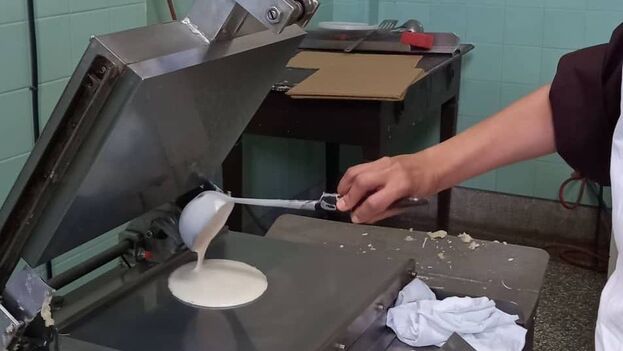
![]() 14ymedio, Havana, 16 November 2022 — The Discalced Carmelite nuns of Havana, who make most of the communion hosts consumed by the Catholics on the island, announced Tuesday that they will resume production. In a previous statement the nuns expressed regret that the country-wide flour shortage prevented them from supplying Cuban dioceses with hosts as they had been.
14ymedio, Havana, 16 November 2022 — The Discalced Carmelite nuns of Havana, who make most of the communion hosts consumed by the Catholics on the island, announced Tuesday that they will resume production. In a previous statement the nuns expressed regret that the country-wide flour shortage prevented them from supplying Cuban dioceses with hosts as they had been.
“To our surprise, the news went viral,” the Carmelites said in an announcement released by Vida Cristiana, a Cuban Jesuit publication. Alluding to a biblical parable about “multiplying the loaves,” they report that they received flour from individuals and institutions in the United States, Puerto Rico and Spain as well as the usual allotment they receive from the state.
“We are now resuming production so that we can offer this service to the Church as soon as possible,” they add.
“We ended up buying hosts in Havana because the Carmelites have a flour contract with the government, a situation that doesn’t exist in other dioceses,” says Fr. Alberto Reyes, a priest in Camagüey. The most practical solution for the church was to consolidate the purchasing process by buying exclusively from the convent. Otherwise, the hosts would have to be produced in the provinces, which would have meant having to deal with “the flour problem,” explains Reyes.
“Even though the nuns have a contract with the state, the process is still complicated. Flour shipments get delayed, supplies run out, a lot of signatures are required for delivery. But, good or bad, the problem is being resolved,” he says.
According to several priests, the Catholic church has been informed that the shipment of flour from which the nuns’ allotment will come has already arrived at the port. “I don’t think this will reach a crisis level, or that we we won’t be able celebrate mass because we don’t have hosts,” Reyes said.
In an announcement published on November 2, the Carmelites reported they were working “with the little flour we have left” and anticipated the national supply of hosts would soon dry up. The message, accompanied by a telephone line for anyone who wanted to help, sparked controversy along with the support of many Catholics on the Island and in Cuban exile communities.
When production came to a halt, the Carmelites lost one of their principle sources of income, threatening their financial self-sufficiency. The nuns at the Havana convent still face the challenge of power outages, which impact their ability to normalize operations.
In the event of another crisis, an alternative would be to import the required quantity of communion wafers from the United States or Europe. But even that would not resolve the problem. “It’s not a product that you can store indefinitely,” says Jose Luis Pueyo, a Spanish priest working in Caibarién. “It’s best not to wait too long before consuming them. That’s why production and supply has to be ongoing.”
____________
COLLABORATE WITH OUR WORK: The 14ymedio team is committed to practicing serious journalism that reflects Cuba’s reality in all its depth. Thank you for joining us on this long journey. We invite you to continue supporting us by becoming a member of 14ymedio now. Together we can continue transforming journalism in Cuba.
